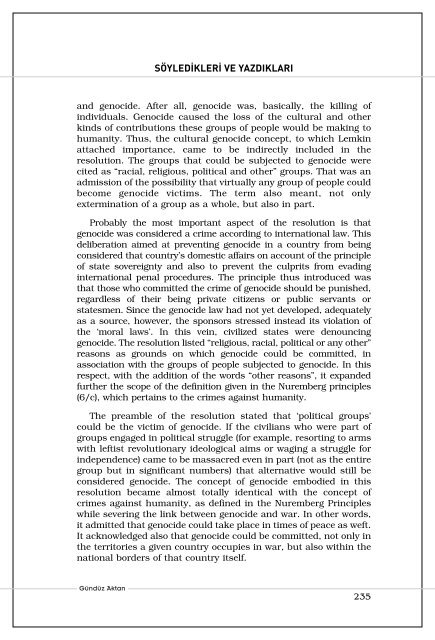gunduz-aktan-kitap-soyledikleri-ve-yazdiklari
gunduz-aktan-kitap-soyledikleri-ve-yazdiklari
gunduz-aktan-kitap-soyledikleri-ve-yazdiklari
You also want an ePaper? Increase the reach of your titles
YUMPU automatically turns print PDFs into web optimized ePapers that Google loves.
SÖYLEDİKLERİ VE YAZDIKLARI<br />
and genocide. After all, genocide was, basically, the killing of<br />
individuals. Genocide caused the loss of the cultural and other<br />
kinds of contributions these groups of people would be making to<br />
humanity. Thus, the cultural genocide concept, to which Lemkin<br />
attached importance, came to be indirectly included in the<br />
resolution. The groups that could be subjected to genocide were<br />
cited as “racial, religious, political and other” groups. That was an<br />
admission of the possibility that virtually any group of people could<br />
become genocide victims. The term also meant, not only<br />
extermination of a group as a whole, but also in part.<br />
Probably the most important aspect of the resolution is that<br />
genocide was considered a crime according to international law. This<br />
deliberation aimed at pre<strong>ve</strong>nting genocide in a country from being<br />
considered that country’s domestic affairs on account of the principle<br />
of state so<strong>ve</strong>reignty and also to pre<strong>ve</strong>nt the culprits from evading<br />
international penal procedures. The principle thus introduced was<br />
that those who committed the crime of genocide should be punished,<br />
regardless of their being private citizens or public servants or<br />
statesmen. Since the genocide law had not yet de<strong>ve</strong>loped, adequately<br />
as a source, howe<strong>ve</strong>r, the sponsors stressed instead its violation of<br />
the ‘moral laws’. In this <strong>ve</strong>in, civilized states were denouncing<br />
genocide. The resolution listed “religious, racial, political or any other”<br />
reasons as grounds on which genocide could be committed, in<br />
association with the groups of people subjected to genocide. In this<br />
respect, with the addition of the words “other reasons”, it expanded<br />
further the scope of the definition gi<strong>ve</strong>n in the Nuremberg principles<br />
(6/c), which pertains to the crimes against humanity.<br />
The preamble of the resolution stated that ‘political groups’<br />
could be the victim of genocide. If the civilians who were part of<br />
groups engaged in political struggle (for example, resorting to arms<br />
with leftist revolutionary ideological aims or waging a struggle for<br />
independence) came to be massacred e<strong>ve</strong>n in part (not as the entire<br />
group but in significant numbers) that alternati<strong>ve</strong> would still be<br />
considered genocide. The concept of genocide embodied in this<br />
resolution became almost totally identical with the concept of<br />
crimes against humanity, as defined in the Nuremberg Principles<br />
while se<strong>ve</strong>ring the link between genocide and war. In other words,<br />
it admitted that genocide could take place in times of peace as weft.<br />
It acknowledged also that genocide could be committed, not only in<br />
the territories a gi<strong>ve</strong>n country occupies in war, but also within the<br />
national borders of that country itself.<br />
Gündüz Aktan<br />
235



